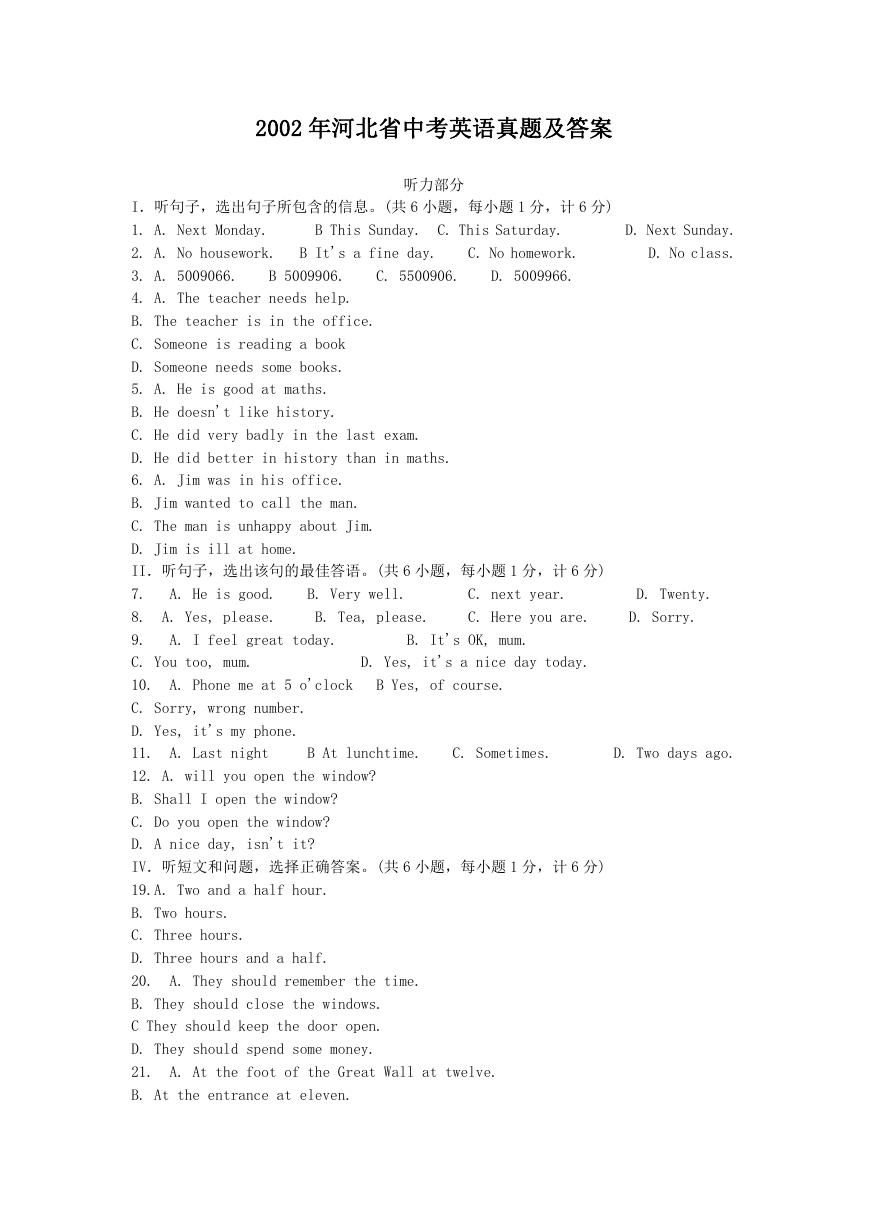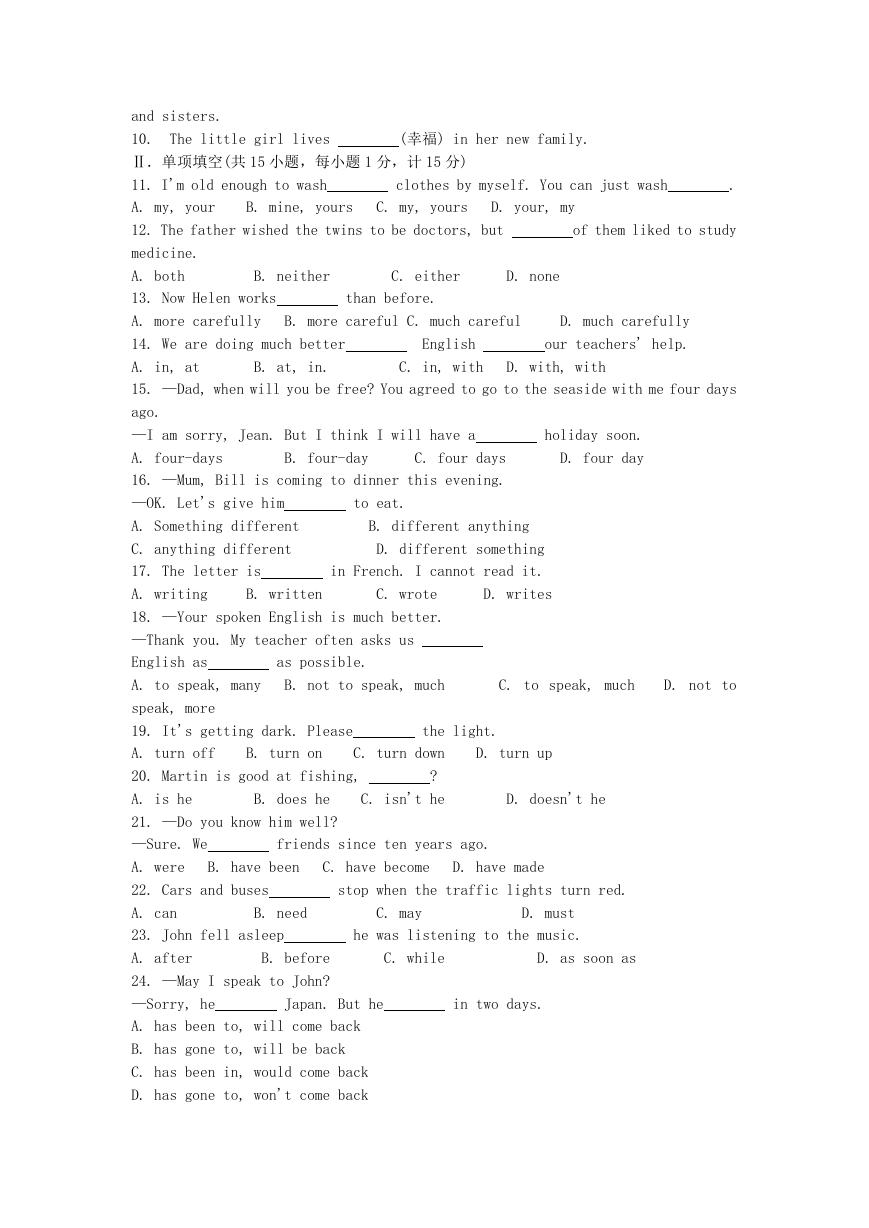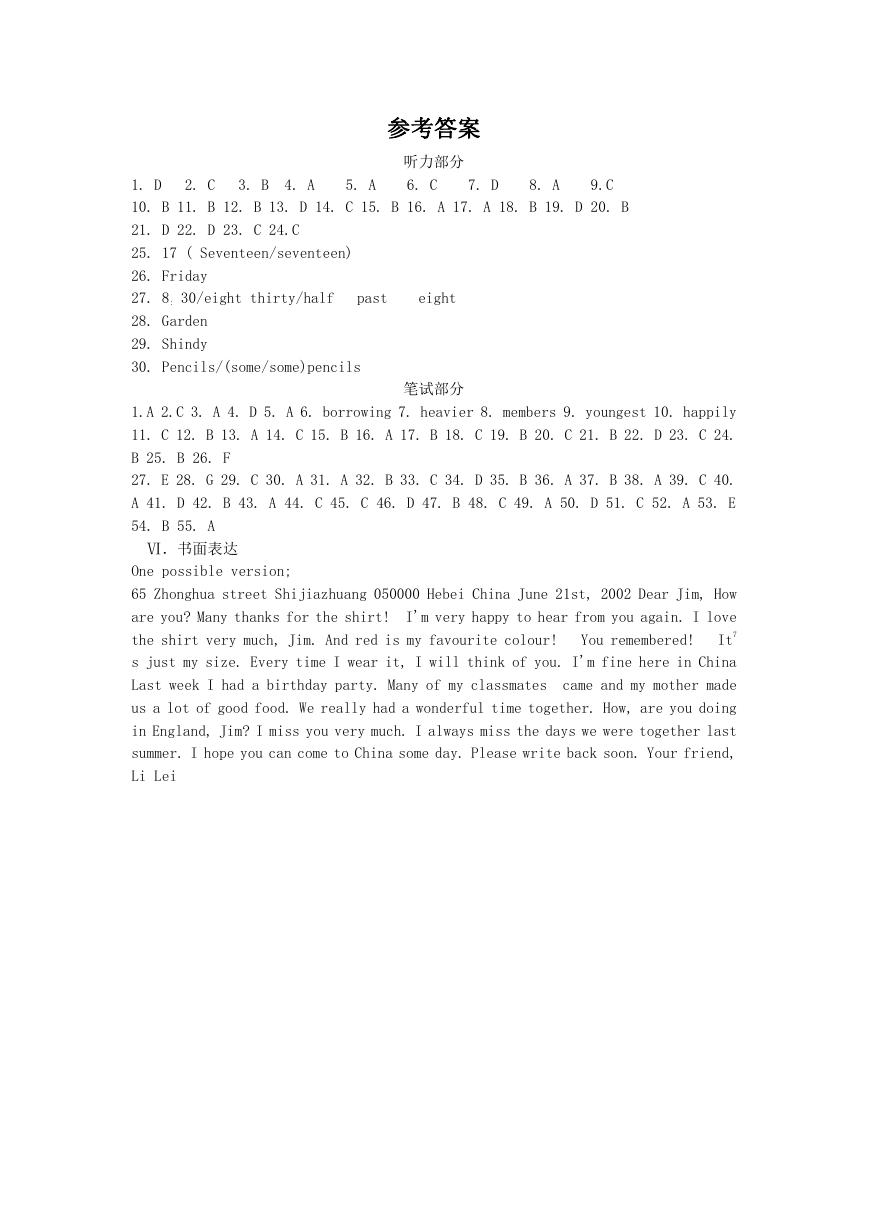D. Next Sunday.
D. No class.
D. Twenty.
D. Sorry.
D. Two days ago.
2002 年河北省中考英语真题及答案
听力部分
B This Sunday.
C. This Saturday.
B It's a fine day.
C. 5500906.
B. Very well.
B. Tea, please.
A. I feel great today.
B. It's OK, mum.
C. No homework.
D. 5009966.
A. He is good.
A. Yes, please.
I.听句子,选出句子所包含的信息。(共 6 小题,每小题 1 分,计 6 分)
1. A. Next Monday.
2. A. No housework.
3. A. 5009066.
B 5009906.
4. A. The teacher needs help.
B. The teacher is in the office.
C. Someone is reading a book
D. Someone needs some books.
5. A. He is good at maths.
B. He doesn't like history.
C. He did very badly in the last exam.
D. He did better in history than in maths.
6. A. Jim was in his office.
B. Jim wanted to call the man.
C. The man is unhappy about Jim.
D. Jim is ill at home.
II.听句子,选出该句的最佳答语。(共 6 小题,每小题 1 分,计 6 分)
7.
8.
9.
C. You too, mum.
10.
C. Sorry, wrong number.
D. Yes, it's my phone.
11.
12. A. will you open the window?
B. Shall I open the window?
C. Do you open the window?
D. A nice day, isn't it?
IV.听短文和问题,选择正确答案。(共 6 小题,每小题 1 分,计 6 分)
19.A. Two and a half hour.
B. Two hours.
C. Three hours.
D. Three hours and a half.
20.
B. They should close the windows.
C They should keep the door open.
D. They should spend some money.
21.
B. At the entrance at eleven.
A. At the foot of the Great Wall at twelve.
C. next year.
C. Here you are.
A. Phone me at 5 o'clock
B Yes, of course.
A. Last night
B At lunchtime.
C. Sometimes.
A. They should remember the time.
D. Yes, it's a nice day today.
�
C At the foot of the Great Wall at eight thirty.
D. At the entrance at eleven thirty.
22. A. They are having a Chinese class.
B. They are having an English exam.
C. They are having a Japanese class.
D. They are having a Chinese exam.
23. A. On the blackboard.
C. On their answer sheets.
D. On the question papers.
24. A. 120 minutes.
B. 60 minutes.
C. 90 minutes.
D. 150 minutes.
V.听对话填空。(共 6 小题,每小题 1 分,计 6 分)
B On the list
KATE'S BIRTHDAY PARTY
Kate will be:
Day of the party.
Time:
Place:
Address:
You can bring:
25
years old
26
27
28
29
30
On
At
At the
Hotel
Street
笔试部分
I.词汇(共 10 小题,每小题 1 分,计 10 分)
A)选择与句中划线部分意思相同或相近的词或短语。
B. just then
C. a short time ago
D. right away
D. at those places
D. get on
B. hold
C. have
We must catch the early bus.
He may have gone to the reading room.
1. Be quick!
A. be in time for
2. Tom was here just now.
A. at the moment
3. —Hi, have you found your lost' book?
—Not yet. I have looked for it everywhere, but I still
haven't found it.
A. here and there
4. Please hand me the book, John.
A. send
5. Mum has a bad headche. We have to send for the doctor at once.
A. ask the doctor to come
B. find the doctor by ourselves
C. send the doctor away
D. go to the doctor's
C. over there
B. somewhere
B. buy
C. leave
D. pass
B)根据下面句子的意思及所给的汉语提示,写出空缺处单词的正确形式(每空一词)。
6. Some people are good at
7. The bag on the left is much
8. This library is open to
9. David is the
(借), but they never give back.
(重) than the one on the right.
(会员) only.
(最小的) of the family, and he is loved by all his brothers
�
.
of them liked to study
B. four-day
than before.
English
to eat.
B. different anything
The little girl lives
(幸福) in her new family.
B. at, in.
C. in, with
D. with, with
B. neither
C. either
D. none
B. more careful C. much careful
B. mine, yours
C. my, yours
D. your, my
holiday soon.
D. four day
clothes by myself. You can just wash
D. much carefully
our teachers' help.
D. different something
in French. I cannot read it.
and sisters.
10.
Ⅱ.单项填空(共 15 小题,每小题 1 分,计 15 分)
11. I'm old enough to wash
A. my, your
12. The father wished the twins to be doctors, but
medicine.
A. both
13. Now Helen works
A. more carefully
14. We are doing much better
A. in, at
15. —Dad, when will you be free? You agreed to go to the seaside with me four days
ago.
—I am sorry, Jean. But I think I will have a
A. four-days
C. four days
16. —Mum, Bill is coming to dinner this evening.
—OK. Let's give him
A. Something different
C. anything different
17. The letter is
A. writing
18. —Your spoken English is much better.
—Thank you. My teacher often asks us
English as
A. to speak, many
speak, more
19. It's getting dark. Please
A. turn off
20. Martin is good at fishing,
A. is he
B. does he
21. —Do you know him well?
—Sure. We
A. were
22. Cars and buses
A. can
23. John fell asleep
A. after
B. before
24. —May I speak to John?
—Sorry, he
A. has been to, will come back
B. has gone to, will be back
C. has been in, would come back
D. has gone to, won't come back
stop when the traffic lights turn red.
B. have been
C. have become
D. have made
C. to speak, much
D. not to
B. turn on
C. turn down
D. turn up
he was listening to the music.
friends since ten years ago.
B. written
C. wrote
D. writes
C. isn't he
D. doesn't he
Japan. But he
in two days.
B. need
C. may
C. while
D. as soon as
as possible.
B. not to speak, much
the light.
?
D. must
�
?
26
27
29
30
Yes, I'd like to return this book, please.
It wasn't the language. It was the words. They are too small for me.
25. —Do you know
—They moved here soon after their son was born.
A. when would the Greens move here
B. when the Greens moved here
C. the Greens would move here
D. when the Greens would move here
Ⅲ.情景对话(共 5 小题,每小题 2 分,计 10 分)选择最佳答话补全对话。
Miss Wu:Can I help you?
Li Gang:
Miss Wu:
Li Gang: No, I couldn't read it. I had a hard time reading a few pages, and then
I decided to give up.
Miss Wu;
Li Gang:
Miss Wu; 28
Li Gang:
Miss Wu;
Li Gang:
Miss Wu;
Li Gang:
you very much. Miss Wu:
A. What about this one?
B. You can't keep the book for long.
C. Another English storybook?
D. Isn't it interesting?
E. Oh? But I know you are good at English.
F. Did you enjoy the book?
G. Yes, they are really small.
Ⅳ.完形填空(共 10 小题,每小题 1 分,计 10 分)
Oh, Oliver Twist. This one is fine. And the words are much bigger. Thank
Well, I'd be glad if you could find me another book.
Yes, but one with bigger words.
What can I do for you then?
You're welcome.
Time spent in a bookshop can be enjoyable. If you go to a 31 shop, no assistant(营
业员) will come near to you and say, "Can I help you?" You 32 buy anything you don't
want. You may try to find out 33 the book you want is. But if you fail, the assistant
will lead(引导) you there and then he will go away. It seems that he is 34 selling
any books at all.
There is a story which tells us about a good shop. A medical(医学的) student 35 a
very useful book in the shop, 36 it was too expensive for him to buy. He couldn't
get it from the library, either. So every afternoon, he went there to read 37 at
a time. One day, however (然而) , he couldn't find 38 from its usual place and was
leaving when he saw an assistant signing (示意) to him. To his surprise, the assistant
pointed to the book 39 , " I put it there so as not to be sold out. "said the assistant.
Then he 40 the student to go on with his reading.
31. A. good
32. A. shouldn't
33. A. what
D. expensive
D. can't
D. when
B. bad
B. needn't
B. which
C. cheap
C. mustn't
C. where
�
34. A. surprised at
C. interested in
35. A. bought
36. A. but
37. A. little
38. A. the book
39. A. in a bookshop
40. A. left
V.阅读理解(共 15 小题,每小题 2 分,计 30 分)
B. not surprised at
D. not interested in
B. found
B. and
B. a little
B. the shop
B. in his hand
B. let
C. read
C. so
C. few
C. the assistant
C. in a corner
C. helped
D. took
D. or
D. a few
D. the shopkeeper
D. in his pocket
D. taught
(A)
People have flown kites in Japan for more than 1, 000 years. There are different
kinds of kites there. Some look like bats (蝙蝠); others look like birds. Most have
pictures on them.
There are many interesting stories about kites in Japan. One story tells about
a thief (小偷) who used a kite. He wanted to steal(偷) the gold(金子) from the top
of a high tower (塔). The thief and his friends made a large kite. One dark windy
night he caught hold of the kite. His friends raised(使升高) it into the air. Then
they moved the kite near the top of the tower. The thief was able to steal the gold.
Another story tells about a father and a son. They were in trouble on an island near
Japan. The father made a large kite. His son flew in it back to Japan.
B. are very small
D. look nice with pictures
The young men of Japan have kite matches. When the kites are flying, the match
starts. The young men try to break each other's kite string(细绳). The last kite
left in the sky is the winner.
41. Most kites in Japan
A. are very large
C. look like bats
42. In the kite match the young men try to
A. make their kites fly high
B. stop each other's kites from flying in the sky
C. make very large kites themselves
D. draw beautiful pictures on their kites
43. The father in the passage made a large kite to help his son to
A. return home
C. fly over the sea
44. The passage mainly(主要的) tells us
A. how to fly kites
B. how a kite match starts
C. something about the kites in Japan
D. what the kites look like
B. fly over the island
D. steal gold
.
.
.
.
(B)
Last Sunday the elephant keeper at London Zoo, Jim Robson, was killed by one
of the elephants he loved. This was terrible, and it could be a big problem for the
future (将来) of London Zoo—and maybe for all of Britain's city zoos.
London Zoo said that it would move its three elephants to a wild(野生的) animal park
�
outside London. Its director-general(总经理), Michael Dixon, said, "We are sorry
that the elephants are leaving; there have been elephants at London Zoo since 1831.
"
One British newspaper said that though many small animals were very interesting,
most people wanted to see big animals—and most of all elephants.
London Zoo is not only losing its elephants. The tigers will also leave soon
and most of the bears(熊) have already gone. Outside the elephant house at London
Zoo, a woman called Mary said she hoped the zoo could keep big animals. "This is
the only way the young people can see animals without traveling to other countries,
" she said.
Zoos are not very good places for animals, but they can help to well keep them.
Children can also learn a lot about the animals when they visit zoos.
Another visitor, a man called Alan, was very angry. "If we send them back to
the wild they will die. If you take away big animals, people will stop visiting London
Zoo. It can survive (继续生存) at the moment, but it won't survive in the future.
"
However, Mary Rosevear, director of the Federation (联合会) of Zoos, believes
.
.
.
.
(相信) that city zoos can survive without keeping large animals.
45. London Zoo has kept elephants
A. since last Sunday
B. for about one hundred years
C. for nearly two hundred years
D. ever since it was built
46. Zoos are important because
A. they can make a lot of money
B. there are many animals living in them
C. there are some big animals there
D. they can keep animals and help children learn about them.
47. The underlined word "It" in the passage refers to(指)
A. the elephant
48.London Zoo might face a big problem because
A. the elephants in the zoo will be killed
B. the elephant may also kill other people
C. it may have fewer visitors in the future
D.
49. Which of the following is NOT true?
A. The writer hopes that big animals except elephants should be kept in London Zoo.
B. London Zoo and the public (公众) have different ideas about where to keep the
big animals.
C.
D. Some people think that the big animals will die if they are sent to the wild animal
park.
Some animals in the park are still dangerous to visitors.
no one would like to be an elephant keeper any more
B. London Zoo
C. the bear
D. the wild animal park
阅读下面短文,把 A—E 五个句子填入文中空缺处(50—54),使短文内容完整正确,然
(C)
�
后完成第 55 题。
Plants are important living things. Life could not go on if there were no plants.
Men live on plants and
50
. But animals and men can't make food from them. 51
If you look carefully
animals, too. So animals and men need plants to live. 52
at the plants around you, you will find there are many kinds of plants. 53
Most
plants are green. Some plants have many small leaves; others have only a few large
leaves. 54
They are different in shapes(形状) and colors.
Except having different shapes and colors, leaves are also different in other
ways. Some leaves have short stalks (叶柄) while others have long ones, some others
have no stalks at all.
A. That is why we find there are so many plants around us.
B. There are many kinds of leaves.
C.
D. This is because plants can make food from air, water and sunlight.
E. Some plants are large while others are small.
55. Which is the best title(题目) for this passage?
A. PLANTS
C. PLANT LEAVES
by eating plants and other animals.
Animals get their food
B. PLANTS AND LIFE
D. MAN AND PLANTS
Ⅳ.书面表达(共计 15 分)
根据提示和要求完成下面短文。
假如你(Li Lei)在去年夏令营认识的一个朋友 Jim 从英国给你寄来一件礼物——一件红
色的衬衫,并附有一封信。在信中他向你问好,他想知道你近来在忙些什么。请你给他写一
封回信(100 个词左右)表示感谢。回信要包括以下内容:
1.向 Jim 问好并对他表示感谢。
2.礼物是你最喜欢的颜色,疋寸很合适,你非常喜欢。
3.告诉 Jim 你近来很好,上周刚过完生日,生日聚会很热闹。询问 Jim 的近况,并表
示希望他能来中国。
�
参考答案
听力部分
6. C
5. A
8. A
9.C
2. C
3. B
4. A
7. D
1. D
10. B 11. B 12. B 13. D 14. C 15. B 16. A 17. A 18. B 19. D 20. B
21. D 22. D 23. C 24.C
25. 17 ( Seventeen/seventeen)
26. Friday
27. 8: 30/eight thirty/half
28. Garden
29. Shindy
30. Pencils/(some/some)pencils
eight
past
笔试部分
1.A 2.C 3. A 4. D 5. A 6. borrowing 7. heavier 8. members 9. youngest 10. happily
11. C 12. B 13. A 14. C 15. B 16. A 17. B 18. C 19. B 20. C 21. B 22. D 23. C 24.
B 25. B 26. F
27. E 28. G 29. C 30. A 31. A 32. B 33. C 34. D 35. B 36. A 37. B 38. A 39. C 40.
A 41. D 42. B 43. A 44. C 45. C 46. D 47. B 48. C 49. A 50. D 51. C 52. A 53. E
54. B 55. A
Ⅵ.书面表达
One possible version;
65 Zhonghua street Shijiazhuang 050000 Hebei China June 21st, 2002 Dear Jim, How
are you? Many thanks for the shirt!
I'm very happy to hear from you again. I love
It7
the shirt very much, Jim. And red is my favourite colour!
s just my size. Every time I wear it, I will think of you. I'm fine here in China
Last week I had a birthday party. Many of my classmates
came and my mother made
us a lot of good food. We really had a wonderful time together. How, are you doing
in England, Jim? I miss you very much. I always miss the days we were together last
summer. I hope you can come to China some day. Please write back soon. Your friend,
Li Lei
You remembered!
�
















 2023年江西萍乡中考道德与法治真题及答案.doc
2023年江西萍乡中考道德与法治真题及答案.doc 2012年重庆南川中考生物真题及答案.doc
2012年重庆南川中考生物真题及答案.doc 2013年江西师范大学地理学综合及文艺理论基础考研真题.doc
2013年江西师范大学地理学综合及文艺理论基础考研真题.doc 2020年四川甘孜小升初语文真题及答案I卷.doc
2020年四川甘孜小升初语文真题及答案I卷.doc 2020年注册岩土工程师专业基础考试真题及答案.doc
2020年注册岩土工程师专业基础考试真题及答案.doc 2023-2024学年福建省厦门市九年级上学期数学月考试题及答案.doc
2023-2024学年福建省厦门市九年级上学期数学月考试题及答案.doc 2021-2022学年辽宁省沈阳市大东区九年级上学期语文期末试题及答案.doc
2021-2022学年辽宁省沈阳市大东区九年级上学期语文期末试题及答案.doc 2022-2023学年北京东城区初三第一学期物理期末试卷及答案.doc
2022-2023学年北京东城区初三第一学期物理期末试卷及答案.doc 2018上半年江西教师资格初中地理学科知识与教学能力真题及答案.doc
2018上半年江西教师资格初中地理学科知识与教学能力真题及答案.doc 2012年河北国家公务员申论考试真题及答案-省级.doc
2012年河北国家公务员申论考试真题及答案-省级.doc 2020-2021学年江苏省扬州市江都区邵樊片九年级上学期数学第一次质量检测试题及答案.doc
2020-2021学年江苏省扬州市江都区邵樊片九年级上学期数学第一次质量检测试题及答案.doc 2022下半年黑龙江教师资格证中学综合素质真题及答案.doc
2022下半年黑龙江教师资格证中学综合素质真题及答案.doc